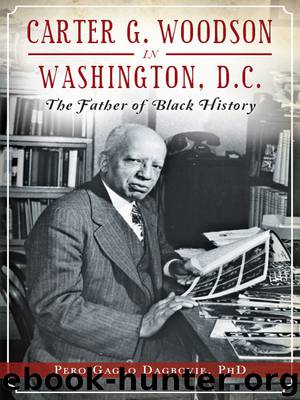Carter G. Woodson in Washington, D.C.: The Father of Black History (American Heritage) by Dagbovie PhD Pero Gaglo

Author:Dagbovie PhD, Pero Gaglo [Dagbovie PhD, Pero Gaglo]
Language: eng
Format: epub
Publisher: Arcadia Publishing Inc.
Published: 2014-10-13T16:00:00+00:00
3
“BECAUSE OF HIS SELFLESS DEDICATION TO THE WORK OF THE ASSOCIATION”
Woodson’s “Mass Education Movement”
Real history requires the elimination of self. Facts must be set forth with objectivity. History must be kept out of the atmosphere of agitation and propaganda. It is not a question as to what the teacher or leader of a group may think about things but what the person taught will think about them when he has learned the facts for himself. Every person under instruction must be given credit for having sense enough to make an inference. Facts set properly forth will tell their own story .
—Carter G. Woodson, 1938
We must go back to the achievements of these black men, then, and looking into these black faces of heroes and heroines, get inspiration to achieve as well as they did. With a vision of these great souls looking down upon us and urging us on to complete the unfinished task to the performance of which they made an outstanding contribution, let us press forward to the next objective in the development and uplift of the despised and rejected of men .
—Carter G. Woodson, 1932
Taken together, the two citations above from the 1930s epitomize Woodson’s philosophy of the purpose of history. Foremost, he viewed black history as a scholarly enterprise. He also enlisted history as a practical tool for black psychological uplift and empowerment. After founding the ASNLH and increasingly by the 1920s, Woodson blended and balanced these two ideologies. He consistently believed that history was a necessary ingredient to African Americans’ self-knowledge and collective identity. One of his most famous sayings was “If a race has no history, if it has not worth-while tradition, it becomes a negligible factor in the thought of the world, and it stands in the danger of being exterminated.” 139 Woodson perceived black history as being an essential part of American history. In a 1927 Negro History Week circular, he underscored: “We should emphasize not Negro History, but the Negro in history. What we need is not a history of selected races or nations, but the history of the world void of national bias, race hate, and religious prejudice. There should be no indulgence in undue eulogy of the Negro. The case of the Negro is well taken care of when it is shown how he has influenced the development of civilization.” 140
Woodson routinely underscored that the purpose of black history was not to focus on how blacks had been victimized but instead on how blacks had influenced U.S. and world history. Woodson insisted, “The aim has been to emphasize important facts in the belief that facts properly set forth will speak for themselves.” 141 As he announced during Negro History Week celebrations, Woodson was opposed to opportunists within the black community who used fictional or hyperbolized expressions of black history as a form of propaganda or black cultural nationalism. In the Norfolk Journal and Guide in 1936, Woodson warned:
Because the public is gullible it will seize upon almost any thing labeled as history.
Download
This site does not store any files on its server. We only index and link to content provided by other sites. Please contact the content providers to delete copyright contents if any and email us, we'll remove relevant links or contents immediately.
Shoot Sexy by Ryan Armbrust(17720)
Portrait Mastery in Black & White: Learn the Signature Style of a Legendary Photographer by Tim Kelly(16996)
Adobe Camera Raw For Digital Photographers Only by Rob Sheppard(16967)
Photographically Speaking: A Deeper Look at Creating Stronger Images (Eva Spring's Library) by David duChemin(16676)
Bombshells: Glamour Girls of a Lifetime by Sullivan Steve(14046)
Art Nude Photography Explained: How to Photograph and Understand Great Art Nude Images by Simon Walden(13028)
Perfect Rhythm by Jae(5392)
Pillow Thoughts by Courtney Peppernell(4271)
The Book of Joy by Dalai Lama(3968)
Good by S. Walden(3543)
The Pixar Touch by David A. Price(3428)
A Dictionary of Sociology by Unknown(3069)
Fantastic Beasts: The Crimes of Grindelwald by J. K. Rowling(3048)
Stacked Decks by The Rotenberg Collection(2876)
Humans of New York by Brandon Stanton(2864)
Read This If You Want to Take Great Photographs by Carroll Henry(2699)
On Photography by Susan Sontag(2627)
Insomniac City by Bill Hayes(2537)
Photographic Guide to the Birds of Indonesia by Strange Morten;(2526)
